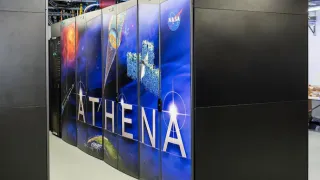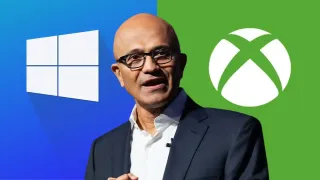As exclusive clubs go, walking on something other than planet Earth is a pretty amazing one. So far, only 12 people have walked on the moon.
People have gone into space before and since, but only a very small and select group of people have actually touched down on what is essentially — an alien world, albeit a small one.
Earth's only natural satellite is around 230,000 miles (370,000 kilometers) away, a mere stone's throw in galactic terms.
It was in 1962 that US President John F Kennedy committed his country to put an astronaut on the moon with the famous speech, "we choose to go to the moon in this decade and do the other things, not because they are easy, but because they are hard".
The backdrop for this ground-breaking achievement was the USA's Cold War "space race" competition with the Soviet Union, which had itself become the first nation to put a man — Yuri Gagarin — in space. Whoever got to the moon first would attain serious bragging rights.
And it was in 1969 that the ground-breaking first walk on the moon took place, with Neil Armstrong the first to make a footprint and utter the words "one small step for man, one giant leap for mankind".

Closely followed by Edwin “Buzz” Aldrin, the duo were the first of 12 people who have walked on the moon in what was termed the Apollo missions. There are 24 people in all who have made the journey — all Americans — with the other 12 remaining on various spacecraft.
The list of astronauts who've walked on the moon during the Apollo era are:
Last time humanity set foot on the moon was 1972
The last time humanity set foot on the moon was 1972. Yep, Pink Floyd releasing "Dark Side Of The Moon" was more recent news. Why have we seemingly moved on from the moon? Simply put, NASA's priorities changed. (It's not you, moon, it's us.)
The nation faced an oil crisis in 1973 and government funds needed to be allocated there, not on the moon. Just like that, the Apollo missions were canceled, forced to end after Apollo 17. With a tighter budget than it had ever had, the space agency shifted gears toward Skylab, the space shuttle program, and various satellites and probes. Maybe not as sexy as moonwalking, the subsequent NASA milestones were nonetheless important.
But all was not lost. In 2018, the moon got popular again. NASA announced plans send humans there as early as 2020. More recently, Elon Musk announced that SpaceX would send humans to the moon — er, around the moon, anyway. If you weren't around for the Apollo program, you still might be alive when a person sets foot on the lunar surface!
The list of astronauts who've walked on the moon during the Apollo era are:
| NAME | MISSION |
|---|---|
| Neil Armstrong | Apollo 11 |
| Buzz Aldrin | Apollo 11 |
| Charles Pete | Apollo 12 |
| Alan Bean | Apollo 12 |
| Alan Shepard | Apollo 14 |
| Edgar Mitchel | Apollo 14 |
| David Scott | Apollo 15 |
| James Irwin | Apollo 15 |
| John Young | Apollo 16 |
| Charles Duke | Apollo 16 |
| Eugene Cernan | Apollo 17 |
| Harrison Schmitt | Apollo 17 |
1. Neil Armstrong
He famously touched moon dust on July 20, 1969, on the Apollo 11 mission. A Navy pilot, engineer, and war veteran, Armstrong was Apollo 11's commander.
2. Buzz Aldrin
Also aboard Apollo 11, Aldrin was right behind Armstrong as they exited the Lunar Module Eagle to set foot on the moon for the first time.
3. Pete Conrad
He was the commander of 1969's Apollo 12 mission to the moon, notably uttering a goofy line as he touched down on lunar soil.
4. Alan Bean
The lunar module pilot of Apollo 12, Bean retired from training NASA astronauts in 1981 to focus on his art (you can see his spacey work here).
5. Alan Shepard
Also the first American ever launched into space, he reached the moon as commander of the Apollo 14 mission.
6. Ed Mitchell
He was the lunar module pilot of Apollo 14 but later gained notoriety for his outspoken opinions on UFOs. In 1972, he founded the Institute of Noetic Sciences, which focuses on bringing "objective scientific tools and techniques together with subjective inner knowing to study the full range of human experiences.
7. David Scott
After having flown on Apollo 9 as command module pilot, he finally reached the moon with Apollo 15 in 1971. He, and his crew, tarnished their reputation a tad with the "postage stamp incident.
8. James Irwin
He was the lunar module pilot for Apollo 15. In the last few decades of his life, the creationist astronaut took several groups on expeditions to find Noah's Ark
9. John Young
He orbited the moon on the Apollo 10 mission, then touched down on the moon as commander of the Apollo 16 mission in 1972. In 1981, he also commanded the first space shuttle flight
10. Charles Duke
He reached the moon with Apollo 16 but is also well known for his role in Apollo 11. During humanity's first trek to the lunar service, Duke served as CAPCOM (capsule communicator), broadcasting his distinctive southern drawl all over the world.
<11. Jack SchmittA geologist first, he was the first scientist not only on the moon, but in outer space too. His feet hit the moon in 1972 as he served as Apollo 17's lunar module pilot.
12. Gene Cernan
Commander of Apollo 17, he was the last person to set foot on the moon. As he boarded the lunar module on December 13th, 1972, he said, "I'm on the surface; and, as I take man's last step from the surface, back home for some time to come — but we believe not too long into the future — I'd like to just [say] what I believe history will record. That America's challenge of today has forged man's destiny of tomorrow. And, as we leave the Moon at Taurus-Littrow, we leave as we came and, God willing, as we shall return: with peace and hope for all mankind. Godspeed the crew of Apollo 17."























